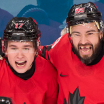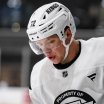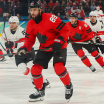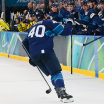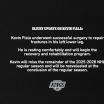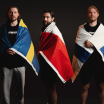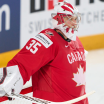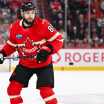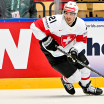Daniel Kim's HockeyDB page doesn't tell the whole story. It states that after playing 16 games for the Long Beach Ice Dogs in the West Coast Hockey League during the 2002-03 campaign, he went on to play seven games for the Bakersfield Condors of the ECHL over parts of three seasons.
What the page leaves out is that Kim only made seven appearances for the Condors because he was working for the club fulltime as its hockey manager. Following his first pro season in Long Beach, he understood that it was unlikely he was going to make to the big leagues, and he had to start thinking about how he was going to make a living.
Daniel Kim: Growing the Game in California
Kim coaches the Jr. Kings Bantam AA team and South Bay Stingrays of the LA Kings High School Hockey League
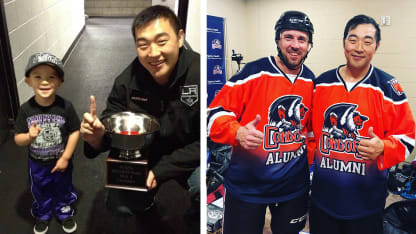
So, he ended up in Bakersfield running their adult league and learn to skate program from his office in the rink. One of the perks of the job, however, was that when Condors players were hurt, Kim got to fill in at home games. For Kim, who acknowledges that he probably shouldn't have been playing pro hockey, it was a dream come true.
And while he doesn't have any points from his 23 professional appearances, he still got on the scoresheet in many of those games. "All I have is penalty minutes," Kim said in between chuckles when reached by telephone. But he came close.
"One time in Long Beach, the team pulled the goalie. I gave the puck to my linemate but he didn't realize there was no goalie, so he dumped it in the corner," he recounted. "I was yelling at him to shoot it, but I guess I would rather have zero goals and zero assists than to just have one point."
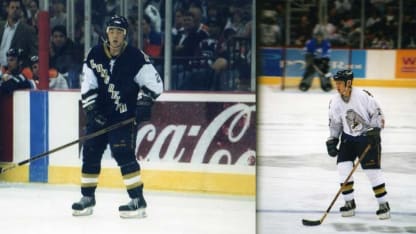
Kim may not have thought he would become a fulltime hockey coach, but the sport has always been a big part of his life.
Born in Seoul, South Korea, Kim immigrated to United States when he was three years old, settling in the Koreatown neighborhood in Los Angeles.
While there weren't any rinks in Koreatown at the time, Kim stumbled onto hockey when Wayne Gretzky came to Los Angeles in 1988 as part of a seismic trade with the Oilers. Kim recalls first seeing him on television and being captivated by his Easton Aluminum stick.
"He'd be out there with this shiny stick and I didn't know who he was," he said. "The more you watched, the more you realize how good he is. That's how I was introduced to hockey."
It wasn't long after watching the Great One that Kim started playing himself. After starting out at public skating sessions, Kim eventually enrolled in hockey. Although he had played multiple sports growing up, from basketball to swimming and diving to baseball, it was hockey that really sparked his interest. He was soon all in.
"I went to extra clinics and stick times before school," Kim said. "I was just addicted to hockey. Once I started I never stopped. I played all those random sports but for some reason hockey just stuck."
As he threw himself into the sport, he studied Kings players such as Gretzky, Alexei Zhitnik, and Luc Robitaille, but as a Korean-American, Kim also drew inspiration from Jim Paek, the first Korean-born player to suit up in the NHL.
"I got into hockey before he played for the Kings and then when he came to the Kings, I was really excited because he was Korean, too," Kim said.
But it was Richard Park, who had a bigger influence on Kim's life. Like Kim, Park was born in Korea and came to southern California with his family at a young age. "I got to meet him once," Kim said. "He came out to one the practices and my dad was able to introduce himself and I talked with him briefly."
Watch: Youtube Video
Those role models, and a love of the game, were what helped drive Kim to be involved in the sport in any fashion he could be.
After finishing his junior career with the Bay City Bombers of the Western States Hockey League, Kim recalled one of his coaches congratulating him on a great career after playing his final game in the WSHL. Kim thought to himself 'I'm not done playing hockey. I'm just going to keep going.'
And he did. The next year he went out to the open invite camp but the Long Beach Ice Dogs but was then cut at the main camp. While he was disappointed, he came back even more determined the following season.
"After that I was really motivated," Kim said. "I trained and played as much as I could, finding ice wherever, playing pickup, playing adult leagues, anywhere."
But instead of having to go through the open tryout process again, Kim got a direct invite to the main camp. Although he was released by the Ice Dogs before the season began, he got a call from the club just before the home-opener. One of their players was serving a long-term suspension and they needed a replacement. Kim jumped at the offer and turned pro with his local team, suiting up for 26 games that season.
While it felt incredible to get into the lineup for that many games, it was during his time in Long Beach that Kim started to realize he probably wasn't going to make a living playing hockey, which is how he wound up in Bakersfield. After a few years with the Condors, including those seven games, he eventually returned home to focus on his future.
Kim's father had passed away not long after he finished playing for the Ice Dogs and he wanted to be closer to family, so he returned home and started coaching. His first gig was coaching the West Valley Wolves in 2007 and he's been behind the bench ever since.
"I'm just a hockey fan who was able to make a living off the sport," he said. "It's great when you can make money with your hobby and then it doesn't feel like work."
After starting out with a pee wee group and bouncing around at nearly every age group level, Kim joined the Jr. Kings in 2012 as an assistant coach. In his first season with the organization, his Mite A team won a Southern California Amateur Hockey Association title.
Following four years with the Jr. Kings, Kim became the Director of Hockey Operations for the Golden Bears at the University of California and remained there until the pandemic struck in 2020.
He's now back with the Jr. Kings, serving as the head coach of the bantam AA team, while also working with the South Bay Stingrays of the LA Kings High School Hockey League, and he couldn't be happier. Even over the telephone, it's unmistakeable how much he loves hockey and coaching.
"I'm basically just a rink rat," Kim laughed. "I'm always in the rink… Ever since I started playing hockey, I've been involved and never stopped. I'm basically just a guy who refused to stop going to the rink."
When I asked Kim what was the most rewarding part of the job, his answer was simple. "It's the kids," he said without missing a beat. "Just seeing them grow as a hockey player and individual. You see them grow up in front of your eyes. I get a front row seat into their lives."
Having spent the last 15 years coaching youth hockey, Kim has indeed had the opportunity to see many of his players grow up. "I have a 2000 age group that I worked with when I first started coaching and now they're all going to college and some are playing junior" he said. "I still talk to them and know their families. I bring a couple of the out to camps and clinics and they hop on the ice with me."
While Kim has no plans to give up hockey anytime soon, he is unsure where his coaching career will take him, especially with a wife and two young sons at home. Although he is intrigued by the prospect of coaching at a higher level, he knows that it will require an even greater commitment and time away from his family.
"I've been very fortunate to get this far along by just coaching and doing various hockey stuff but sometimes I think, do I keep working on this grind… or should I get a normal day job," he said.
But I'm not buying it. Even after I share with him some of my own doubts about whether I should continue writing about hockey from the side of my desk, it quickly becomes apparent that Kim isn't going anywhere. He's in it for the long haul.
"I don't see myself giving up hockey because I love hockey so much and it's been really good to me," he said. "I'll always be really grateful to this sport and I don't see myself stopping at any point."
And why should he? Kim gets to share his passion for the game and mentor the next generation of players. He's living out his dream, something that so few of us get to do.
What could be better than that?






